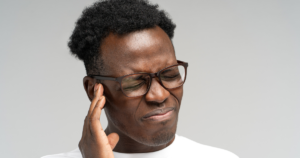National Protect Your Hearing Month
October 8, 2021 This October marks National Protect Your Hearing Month, an annual public health campaign spearheaded by numerous federal agencies in order to raise awareness about noise-induced hearing loss and to provide useful steps that people can take to protect their hearing. According to the Centers for Disease Control and Prevention (CDC), 22 million workers face dangerous levels of noise exposure on the job each year, and millions of other American adults report never or rarely wearing hearing protection at entertainment venues or loud sporting events. Once a person experiences hearing loss from loud noises, the damage can be irreversible. It is important to take precautions to protect your hearing before it is too late.
This October marks National Protect Your Hearing Month, an annual public health campaign spearheaded by numerous federal agencies in order to raise awareness about noise-induced hearing loss and to provide useful steps that people can take to protect their hearing. According to the Centers for Disease Control and Prevention (CDC), 22 million workers face dangerous levels of noise exposure on the job each year, and millions of other American adults report never or rarely wearing hearing protection at entertainment venues or loud sporting events. Once a person experiences hearing loss from loud noises, the damage can be irreversible. It is important to take precautions to protect your hearing before it is too late.
How Does Hearing Loss Happen?
Hearing loss occurs when there is a problem with the ear, the nerves connected to the ear, or the part of the brain that controls a person’s ability to hear. When someone experiences hearing loss, it not only affects his or her ability to hear or understand speech but also other sounds as well. Per CDC data, when a person sustains short-term or permanent hearing loss, the following factors are usually at play:
- Damaged hair cells in the ear. On average, a person is born with 16,000 hair cells in their cochlea (inner ear). Hearing tests generally cannot detect an issue until 30% to 50% of a person’s hair cells have been damaged or destroyed from hazardous levels of noise exposure
- Damage to the nerves in the ears. Similar to how noise can damage or destroy the hairs in the cochlea, it can also damage the auditory nerve that carries a signal from the ear to the brain
- Damage to the cells and membranes in the cochlea, which typically results from a single loud noise or repeated exposure to high noise levels
The Mayo Clinic reports that some of the most common signs and symptoms of hearing loss may include difficulty understanding words, especially against background noise or in a crowd, muffling of speech or other sounds, trouble hearing consonants, needing to turn up the volume of a television or radio, frequently asking others to speak more slowly, clearly, and/or loudly, withdrawal from conversations, and avoidance of some social settings (due to difficulty hearing). If you are experiencing trouble hearing, it is a good idea to set up an appointment with your healthcare provider to discuss how to proceed.
Preventing Hearing Loss at Work
While almost all cases of hearing loss that result from high levels of occupational noise exposure are preventable, millions of workers – like those who go without proper training, supervision, and personal protective equipment (PPE) – sustain irreversible damage to their hearing every year. To reduce noise-related hazards, the Occupational Safety and Health Administration (OSHA) requires that employers take certain steps to protect workers. Here are a few examples of the effective safety standards and engineering controls that OSHA has in place:
- Maintain and lubricate machinery and equipment to avoid excessive noise during start up and operation
- Choose low-noise tools and machinery
- Enclose or isolate noise sources
- Place a barrier between the noise source and employee, like curtains or sound walls
- Provide workers with a quiet area so they can gain relief from hazardous noise sources
- Operate especially noisy machinery when fewer people are in close proximity
- Limit the amount of time that workers spend around known noise sources
Tips for Everyone: How to Protect Your Hearing at Entertainment Venues or Sporting Events
According to the CDC, 50% of young people listen to music in their car or headphones too loudly, and 4 out of 10 young people sustain dangerously high levels of noise exposure at events like concerts or sports games. To reduce hearing-related risks, the agency recommends that individuals try to avoid loud noises by moving away from speakers at concerts or events, spending less time at noisy restaurants, and turning down the volume on headphones or earphones. People can also use hearing protection, like hearing protection earmuffs or earplugs when they are in a loud environment.
Over time, almost everyone experiences gradual – but chronic – hearing loss, or presbycusis. Presbycusis affects approximately 1 in 3 adults between the ages of 65 and 74-years-old and nearly 50% of individuals over the age of 74. While gradual hearing loss is largely not preventable, there are steps that we can all take to reduce our chances of sustaining hearing loss from unnecessary or unsafe levels of noise exposure. To commemorate National Protect Your Hearing Month, you can read more safety tips on ways to protect your hearing.
If you have a legal question or concern, someone at our firm can help. To speak with someone, contact a representative online now.
Philadelphia Workers’ Compensation Lawyers at Galfand Berger, LLP Representing Injured Victims Since 1947
Galfand Berger LLP has offices located in Philadelphia, Bethlehem, Reading and Lancaster, we serve clients throughout Pennsylvania and New Jersey. To schedule a consultation, call us at 800-222-8792 or complete our online contact form.
 Google Screened
Google Screened
